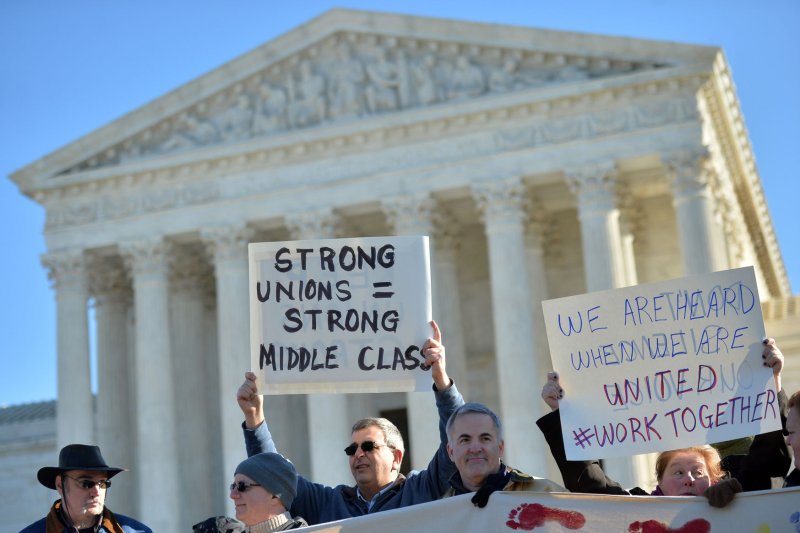1 of 4 | Activists rally Monday outside the Supreme Court as the high court hears arguments in the Friedrichs v. California Teachers Association case, in Washington, D.C. This case will decide whether California and 22 other states can make public-employees, such as public school teachers, pay union agency fees. Photo by Kevin Dietsch/UPI |
License Photo
WASHINGTON, Jan. 11 (UPI) -- The Supreme Court on Monday will consider a legal challenge on a 1977 ruling in a case against the California Teachers Association, the state's largest teachers union, which could threaten the financial strength of public-employee unions nationwide.
The case -- Friedrichs v. California Teachers Association -- will essentially determine if some teachers can defect from the CTA without having to pay state-mandated fees to their state and local unions. California is one of 23 states that require fees be paid for public employee unions, even if an individual public employee does not belong to the union.
Following the 1977 Abood v. Detroit Board of Education ruling, the Supreme Court allowed public-sector unions to charge fees on nonmembers whom they represent to cover the cost of bargaining over working conditions that will benefit both members and nonmembers. The court did rule that nonmembers cannot be charged a fee to cover for a union's political activity.
The argument led by Rebecca Friedrichs, a veteran Orange County public school teacher, and other nonmembers against the CTA seeks to nullify even bargaining-related fees on the grounds of free speech.
"Public-sector unions' collective-bargaining efforts constitute political speech designed to influence governmental decision-making," the Friedrichs petition writes. "In this era of broken municipal budgets and a national crisis in public education, it is difficult to imagine more politically charged issues than how much money cash-strapped local governments should devote to public employees, or what policies public schools should adopt to best educate children."
Teachers in California who do not belong to the union pay up to $400 of the roughly $1,000 in state and local union dues. The CTA has about 350,000 members but it is not known how many teachers opt out of their unions.
Jennifer Thomas, president of CTA's San Jose Unified School District union, estimates less than 1 percent of her members opt out of paying union dues.
"Here is their logic: Because unions cannot charge nonmembers for political activity and since nonmembers argue that everything a public-sector union does -- even bargaining -- is political in nature, it follows that any fees violate their First Amendment right not to pay for activity to which they object," Lyle Denniston writes for SCOTUSBlog.
The government of California and the CTA have argued the Abood-challenging nonmembers have not indicated any specific collective-bargaining actions attributed to the CTA that they considered as "political." The pro-union argument states that non-union members should not get a "free ride" if they benefit from collective-bargaining agreements heralded by the union but do not pay related fees.
The California government also said the nonmember group objects to everything the teachers' union does in collective bargaining -- no matter the issue. The state argues that negotiations such as for leave from work or the condition of faculty lounges are in no way political and that there is no method to draw a distinction between work conditions and matters of public policy during bargaining negotiations.
National Nurses United, the nurses organization nationwide, said it will hold a protest Monday outside of the Supreme Court building in Washington D.C. in support for Abood and the CTA -- stating the Friedrichs case "poses a significant threat to public health, safety and quality of life."
"If the Supreme Court overturns the decision... public-sector unions could be barred from requiring any fair share payments from any represented employees even while still being mandated, at considerable cost, to represent all employees in bargaining for wages, health benefits, staffing levels and other conditions of employment -- in effect subsidizing free riders," NNU wrote in a statement.















